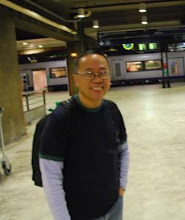This is perhaps the earliest picture of my father Gerardo and his younger brother, Manuel, together. My dad, born in 1924, was about 7 years old here, while Tatang Titong--that’s how we called our uncle--was 5.They had two other siblings--the eldest, Imang Elsie and the youngest, Tatang Matt. But it was my father and uncle who gravitated towards each other, and, in youth and in old age, they would become an inseparable pair. More than brothers by birth, they were also tight, bosom buddies, growing up and going to school together, sharing the same dreams and eventually raising their own families while living as neighbors in Mabalacat.
My Dad was a junior—and the eldest boy in the family, so by virtue of his rank, he pretty much had his own way and got away with most of his shenanigans. He took under his wing his younger brother, who would become a sort of a disciple and sidekick. During the War years, both went to the local elementary school that was Japanese-controlled. My Dad once recounted how his brother, unable to recite properly, was slapped by his impatient Japanese teacher , sending his spectacles flying. My father was enraged, of course, but could do nothing to save his poor brother from his teacher’s torment, the one rare time he could not defend him.
It was only after class that he managed to comfort my uncle, whom he endearingly called Tits, and that incident cemented their brotherly bond even more. High school found my father enrolling at the Ateneo only to be kicked out in his second year for smoking on campus. Tatang Titong, however, would go on to pursue and finish his Fine Arts studies at the University of Sto. Tomas. I remember seeing some of the artworks my uncle created as a student: oil paintings of the Last Supper, the Virgen de Antipolo, and an escayola bust of his mother, Apung Tiri.
My uncle would retain this creative streak in later years, and I would often find him tinkering in his tool room and transforming found objects into decorative items. One time, he even created candle stands for All Saints’ Day using upturned tin saucers as bases, metal tubings as candle holders and ordinary nails as candle pricks. He became a handyman, to whom we would run to repair broken toys, med household items.
When my Dad and Tatang Titong got married, both had quite a rough start in establishing this new chapter in their lives. My Dad had it easier, as he lived in my Ingkung’s place, although at one point he drove jeepneys for a living. Tatang Titong vetoed a suggestion from his parents to go on a buy-and-sell-clothing business, preferring to be a jeepney driver instead, obviously influenced by his elder brother.
For some reason, Tatang Titong ended up running a Shell Gas Station in front of Clark Field, which proved to be a viable business. He and my aunt, Imang Toring moved to Balibago where they kept house just behind the gas station they managed. I remember my many visits to their house, getting to know my first cousins up close and personal, often playing games together, spinning records and trading comic books.
INSEPARABLE AT BIRTH. Brothers Titong and Dong, sharing a drink and having a blast in Baguio City. Early 1970s.
The oil crisis in the 70s took a toll on the revenues of my uncle’s gas station. Instead of giving it up, my father ended up buying his business, which he operated for just under a year, before he too called it quits. Tatang Titong sold their Balibago house and relocated back to Mabalacat, to the unoccupied ancestral house of his uncle, Ingkung Pepe Morales that was just next-door to our residence. Now neighbors again, happy days were back for my dad and his favorite brother. They would do so many things together—from running their realty estate business from their office in Mabiga to going out for drinks, PX shopping and painting the town red riding their scooters.
For us, it was also a chance to get even closer with my cousins and there was not a day that we did not drop by each other’s place just to make ‘komusta’. We even attached a line of wire that ran across our two houses which, through a series of pulleys, could be used to exchange written communications with my cousins, when rains made it impossible for us to visit. I remember these years as a happy time for both our families, filled with the animated laughter of Castro kids and relatives.
Unexpectedly, all these came to a sad end when Tatang Titong suffered a stroke while riding his scooter on his way back to the office. He lapsed into a coma and passed away on 17 March 1989, just a few days before his son Ferdie’s wedding. Though my father was not a demonstrative man, I knew he felt the loss of his brother deeply, and I knew his days without him will never be the same again. After all, they were mag-“kapatad”, or ‘kaputul’—cut from the same cloth, born and grown from the same root. More than a “kadaya” (of the same blood), he was a “koyang Dong” to his “waling Tits”, a sibling relationship that had far-reaching influence in the way their lives were lived, creating a strong familial alliance that we, as an over-extended family, continue to uphold today, long after they have left this mortal world.










No comments:
Post a Comment